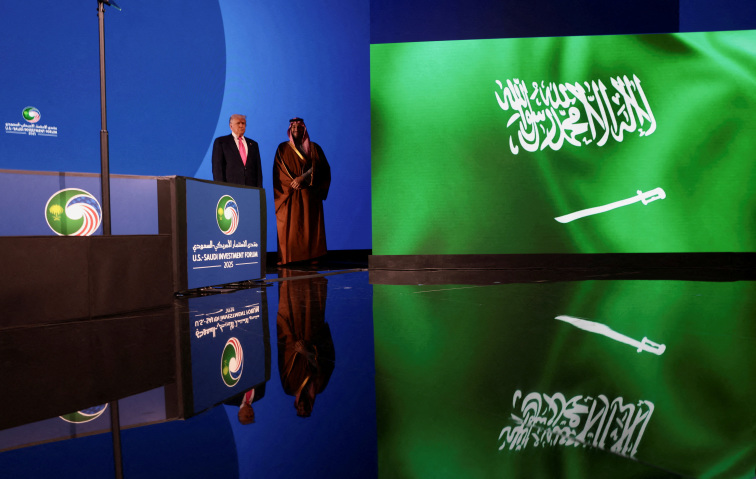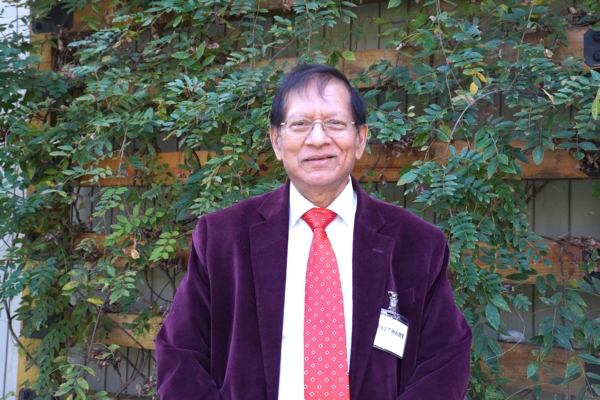On November 23, 2025, the Free Communications Association held a forum titled “The Invisible Long Arm: Taiwan Has Long Been in a Silent Unrestricted War” to expose and analyze the CCP’s methods of transnational repression. (Song Bilong/The Dajiyuan)
[People News]On November 23, the Republic of China’s Free Communications Association held an anti–transnational repression/persecution forum in Taipei under the theme “The Invisible Long Arm: Taiwan Has Long Been in a Silent Unrestricted War,” inviting scholars and experts to participate in discussions.
According to the Taiwan report by Dajiyuan journalist Zhong Yuan, the forum hosted by the Republic of China’s Free Communications Association was moderated by Professor Chang Chin-hua, honorary professor at National Taiwan University’s Graduate Institute of Journalism. Participants included Nie Sen, former professor at the School of Engineering and senior research fellow at the Human Rights Center at the Catholic University of America; Ming Jucheng, honorary professor in the Department of Political Science at National Taiwan University; Cheng Chin-mo, former director of Tamkang University’s Department of Diplomacy and International Relations; and Taiwanese human rights worker Lee Ming-che.

On November 23, 2025, the Free Communications Association held a forum titled “The Invisible Long Arm: Taiwan Has Long Been in a Silent Unrestricted War” to expose and analyze the CCP’s methods of transnational repression. (Song Bilong/The Dajiyuan)
Experts: Anti–Transnational Repression — Falun Gong Practitioners’ Truth-Clarification Strongly Shocks and Deters the CCP
Nie Sen pointed out that the CCP has engaged in unrestricted warfare within the United States using U.S. media and legal lawsuits to attack Shen Yun Performing Arts and Falun Gong. For example, this year Shen Yun performances at the Kennedy Center in Washington, D.C., and at Lincoln Center in New York received terror threats. To date, the CCP has issued more than 150 death threats attempting to interfere with Shen Yun’s operations.
Nie Sen once helped rescue a survivor of the CCP’s forced organ harvesting—Heilongjiang Falun Gong practitioner Cheng Peiming. He said that over the past three years, Cheng Peiming faced severe long-arm jurisdiction and transnational persecution by the CCP in Washington, D.C., New York, and New Jersey, including dozens of incidents of surveillance, tire sabotage, stalking, death threats, malicious car crashes, and coercion of his relatives in mainland China, all intended to create a chilling effect.

Professor Nie Sen, honorary retired engineering professor at the Catholic University of America. (Song Bilong/The Dajiyuan)
He said the CCP has infiltrated 53 countries and established 108 overseas police stations exercising long-arm jurisdiction. Through undercover agents, the CCP monitors, intimidates, coerces, and forcibly repatriates overseas Falun Gong practitioners and Chinese dissidents—returning 230,000 Chinese citizens to mainland China in just over a year. The CCP also uses Confucius Institutes and the “Thousand Talents Plan” to recruit Chinese students and scholars to infiltrate campuses and research bases and to steal technology and military intelligence.
Ming Jucheng said that in order to annex Taiwan, the CCP employs a two-pronged strategy: combining hard power (military intimidation) with soft power (propaganda, infiltration, united front tactics, bribery, intimidation, assassinations, etc.) to increase the cost for Taiwan and the international community to counter the CCP. He noted that the CCP is increasing transnational repression against Taiwan, with Falun Gong being the main target. Shen Yun performances in Taiwan and the screening of State Organs—a film exposing the CCP’s organ harvesting—have also faced intimidation.

Professor Ming Jucheng, honorary professor in the Department of Political Science at National Taiwan University. (Song Bilong/The Dajiyuan)
Ming Jucheng emphasized: “Humanity will win! Tyranny will perish!” He pointed out that the global anti-communist wave is rising and many countries have become alert to the CCP’s infiltration. Taiwan should seize this opportunity to strengthen international cooperation. Taiwan should also consolidate internally—patiently communicate with and persuade pro-CCP individuals (whether knowingly or unknowingly pro-CCP), helping them understand that “The CCP is not China” and “Without the Chinese Communist Party, there will be a new China.” Taiwan must unite international forces and internal forces to counter the CCP through non-military means.
Chang Chin-hua noted that while most countries still adopt dovish policies toward the CCP, Falun Gong practitioners—guided by belief in religious freedom, freedom of speech, and human rights—have used peaceful, nonviolent methods, including establishing media organizations, Shen Yun Performing Arts, and displaying banners in front of CCP embassies year-round to tell the truth. Their efforts have propelled the global anti-communist movement and caused a dramatic shift in the international community’s stance toward the CCP.
Nie Sen pointed out that in the CCP’s 26-year-long persecution of Falun Gong, practitioners have peacefully resisted persecution. They have filed more than 40 legal complaints, making human rights criminals within the CCP fear traveling abroad lest they be arrested. On the 21st anniversary of the publication of The Nine Commentaries on the Communist Party by the Dajiyuan, more than 450 million Chinese people have quit the CCP and its affiliated organizations (“three withdrawals”). Additionally, Falun Gong practitioners’ anti-internet-blocking software and Shen Yun’s revival of traditional Chinese culture have helped many Chinese people learn the truth.
Experts: The CCP’s Long-Arm Jurisdiction Violates Other Countries’ Sovereignty
Regarding measures by the free world to curb CCP interference, Nie Sen said the U.S. has established the Foreign Agents Registration Act, and recently, both the U.S. House and Senate jointly introduced policy bills addressing transnational repression. Canada has passed an anti-foreign interference law; the U.K. has passed a national security law and established corresponding policies that Taiwan may reference.
He added that in terms of law enforcement, the U.S. has established dedicated agencies (such as the FBI and the Department of Homeland Security) to jointly combat transnational repression. He believes the Five Eyes, the EU, and Asian countries should strengthen intelligence-sharing and cooperation to jointly counter transnational crime.
Cheng Chin-mo noted that transnational repression usually refers to a government’s repressive actions targeting individuals abroad, including military invasion, information warfare, assassinations, or kidnappings. Regarding countermeasures Taiwan should adopt, he believes that at the legal level, Taiwan should establish “defensive democracy” legislation, promote a “foreign agents act,” strengthen the “anti-infiltration law,” and establish a legal definition of “transnational repression.”

On November 23, 2025, scholar Cheng Chin-mo stated that Russia’s primary forms of transnational repression include military invasion, cyberattacks, and assassinations and kidnappings of dissidents in Ukraine. (Song Bilong/The Dajiyuan)
Cheng Chin-mo stated that in terms of intelligence and law enforcement, Taiwan must cut off the CCP’s long-arm jurisdiction by investigating “affiliated organizations” and united front outposts and strengthening protection for Hong Kong residents and exiles residing in Taiwan.
Lee Ming-che cited his own experience, saying that the CCP treated his online criticism of the CCP in Taiwan as “subversion of state power,” treating him as though he were under CCP jurisdiction—a violation of Taiwan’s sovereignty and a textbook case of transnational repression.

On November 23, 2025, the Free Communications Association held a forum titled “The Invisible Long Arm: Taiwan Has Long Been in a Silent Unrestricted War” to expose and analyze the CCP’s methods of transnational repression. Pictured: Taiwanese human rights worker Lee Ming-che participating in the discussion. (Song Bilong/The Dajiyuan)
Lee Ming-che, who was imprisoned by the CCP for five years, said that Taiwanese people often mistakenly believe that only advocates of Taiwan independence are targeted by the CCP. In reality, after his arrest in China, some Taiwanese were also detained by the CCP for national security reasons, many of whom advocated cross-strait unification or were friendly toward the CCP. Therefore, people should not assume that they will avoid arrest simply because they do not support Taiwan independence.
Lee Ming-che pointed out that the CCP’s transnational repression against Taiwan aims to intimidate Taiwanese people into giving up freedom of speech and the right to self-determination, while shrinking Taiwan’s international presence. He urged that Taiwan must stay united, uphold democracy and freedom, and seek international support. In facing the CCP’s transnational repression, all democratic countries must cooperate to jointly contain the CCP’s aggression against the international community, which will help maintain political stability in democratic countries. △











News magazine bootstrap themes!
I like this themes, fast loading and look profesional
Thank you Carlos!
You're welcome!
Please support me with give positive rating!
Yes Sure!